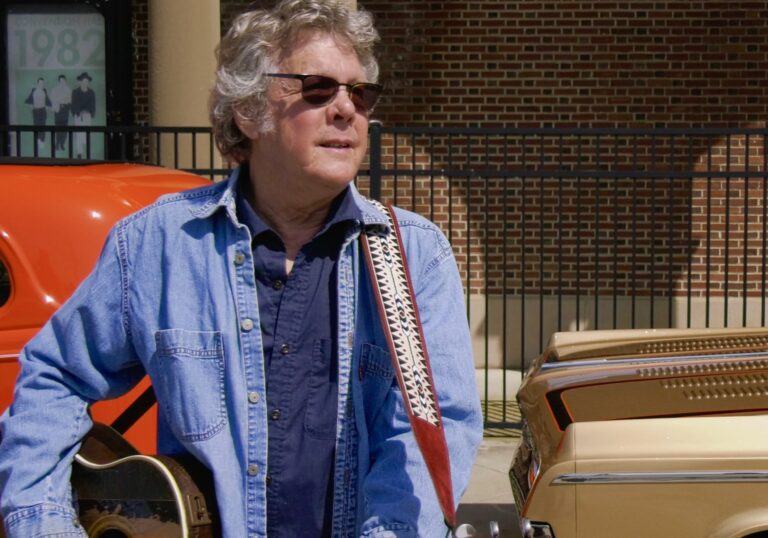Steve Forbert is a true American musical treasure, a fact underscored by his newest album, Daylight Savings Time, on Blue Rose Music. Like all his albums of original songs, it’s suffused with what venerated rock journalist Robert Christgau discerned as his “omniverously observant” songwriting, marked by Steve’s gift for finding the deeper meaning and magic within the spectrum of everyday moments, as well as his abundant melodic and poetic enchantment.
“Like Warren Zevon, Gram Parsons, Bob Dylan, Tom Petty and Bruce Springsteen, Steve Forbert has left his unmistakable imprint on the landscape of American music,” says American Songwriter. As with such other esteemed creative souls, his work is marked by distinctive qualities all his own and speaks genuinely to his listeners.
As Forbert approaches the milestone of his 70th birthday, Daylight Savings Time contemplates and celebrates the proverbial ‘extra hour of daylight’ that comes with the time change. “Yeah to chirping crickets and to daylight savings time!” he sings on the album’s first single “Sound Existence,” “The best ain’t yet to come, but you could still get by just fine.”
References to the natural world permeate the album. “Birds land in a tree so symmetrically, “ he observes in the album’s opening track “Clouds Roll Past The Sky.” The meditative “One Lone Leaf” augurs the coming end of summer, while “Pour A Little Glitter On It, Baby” salutes the wonder of the blazing hues on the trees in the season that follows.
“Purple Toyota” bemoans how corporate culture has toned down the once more-colorful shades of vehicles on our roadways. A drive along the “Dixie Miles” – which recounts the route he would regularly travel to visit his parents while living in Nashville and raising his twin sons and daughter – notes how, “As far as I’m concerned now the sun’s still way up in a kind, blue sky.”
“Guilt Tripper” advises giving wide berth to those who might harsh our lives. On the deceptively happy sounding “The Blues,” Steve ponders how depression lurks like a ghost among our emotions, and he summons up a boogie-woogie groove on “Simon Says” that playfully urges leaving youthful indulgences behind. Because as “Tomorrow Song” observes, the immediate future “is only a day away.”
When Steve arrived in New York City from his Meridian, Mississippi hometown in 1976, his aim was establishing a lifetime of creating, performing and recording the songs he’d started writing at age 17 after cutting his teeth as a teen in local rock bands. He slotted seamlessly into the “new folk” revival in such Manhattan clubs as Folk City, The Bitter End and Kenny’s Castaways yet at the same time took the stage at CBGB, ground zero of the burgeoning punk/new wave movement. He also busked on the streets of Greenwich Village and in the elegant confines of Grand Central Station.
Forbert chose his solo approach of voice, acoustic guitar and harmonica, accented by foot stomps, to best approximate the melodic fullness and drive of a band. It inevitably caused him to be tagged as one of the numerous “new Dylans” that emerged in the 1970s. “Evoking the young Dylan has become a cliché for artists of this sort,” observed The New York Times, “but, in this case, Mr. Forbert deserves the evocation.” Steve’s focus, however, was on refining his own singular musical voice and personality.
He quickly won a major label deal with Nemperor/CBS Records and released his heralded debut, Alive on Arrival, in 1978. His next album, Jackrabbit Slim, won similar acclaim and brought wider renown to Forbert with its #11 pop chart hit “Romeo’s Tune.” It provided the stature for his troubadour existence, which has kept him active ever since as “a striking performer, very much worth seeing and hearing,” according to the New York Times.
Aside from a six-year hold on his recording career in the mid-1980s due to creative and contractual differences with his label, Steve has consistently issued what’s become a rich catalog of 20 studio albums featuring his abundant gifts as a writer of fine songs. His consistent touring either solo or with various accompanying configurations is distinguished by how every show is markedly different and truly of the moment. It has yielded four live album releases on record labels plus 14 more concert recordings available exclusively on his website. His oeuvre is further rounded out by a tribute album to his fellow Meridian native, country music founding father Jimmie Rodgers, Any Old Time (nominated for a Best Folk Album Grammy award),
Steve’s 2020 LP of interpretations of favorite songs by other talents that have inspired him, Early Morning Rain, and collections of outtakes and early recordings.
Daylight Savings Time is Forbert’s third album helmed by producer/engineer Steve Greenwell. Its basic tracks were cut old-school style at Greenwell’s studio in Asbury NJ, where Steve now resides, with drummer Aaron Comess of the Spin Doctors and keyboard player Rob Clores, who has played with Jesse Malin, The Black Crowes, Tom Jones and others. Modern digital recording technology helped round out the mix, with the disc’s supple bass lines added long distance by Byron House, whose many credits include such notables as Dolly Parton, Emmylou Harris, Johnny Cash, Al Green, The Dixie Chicks and Robert Plant’s Band of Joy. Gurf Morlix, whose guitar and production gifts were elemental in launching Lucinda Williams into the spotlight tracked his note-perfect six-string contributions at his home studio just outside Austin, Texas.
Venerable Milwaukee concert promoter, Peter Jest, perhaps best encapsulated Forbert’s creative presence in praising how his “ability to craft songs that capture the essence of the human spirit is nothing short of remarkable.
His voice is a beacon of authenticity in a world saturated with noise.”

